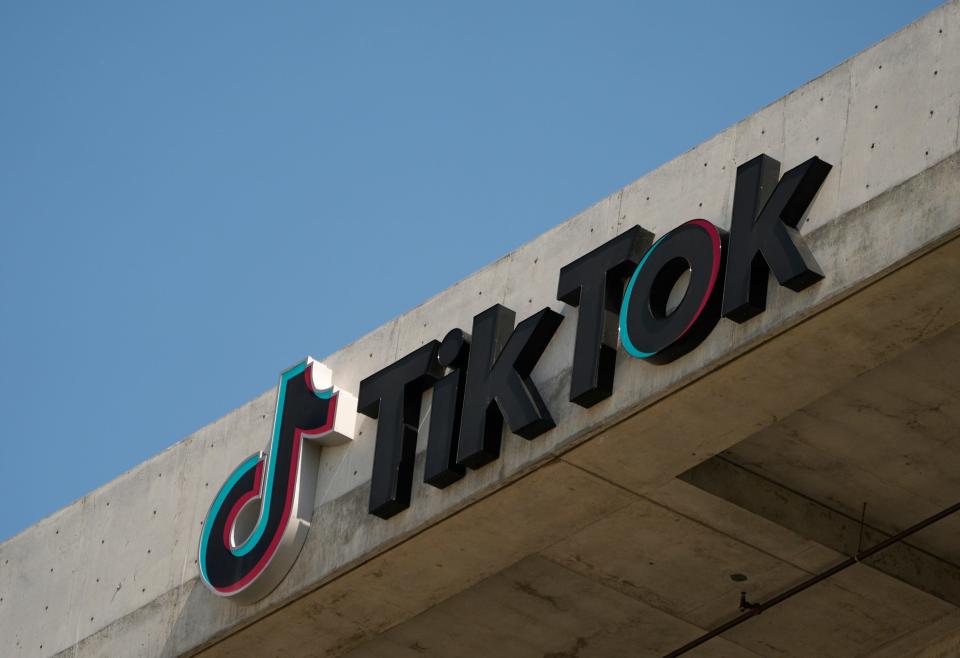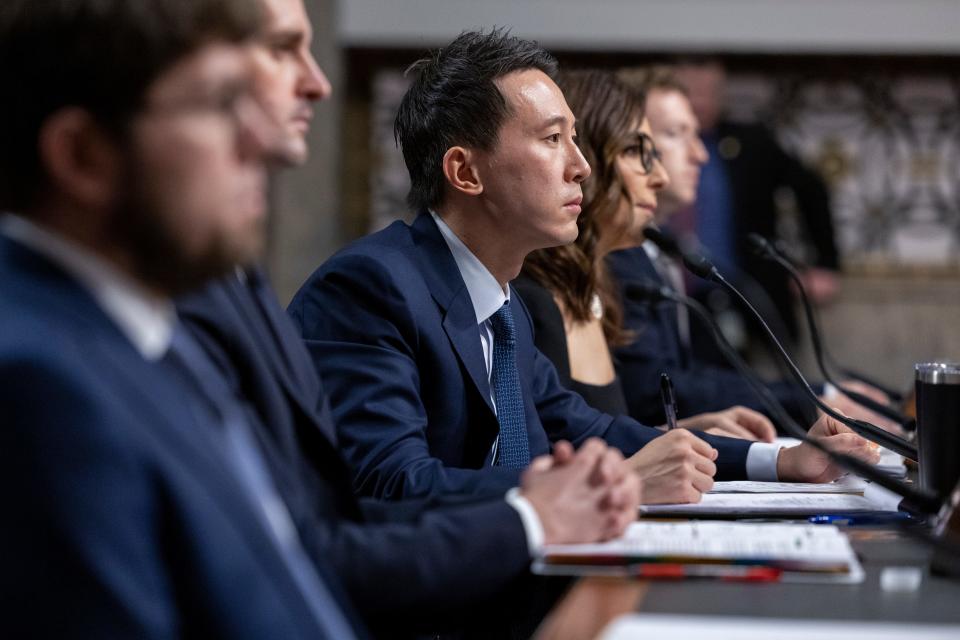Donald Trump's Tiktok ban position flip-flopped. What's behind his change of heart?
Former President Donald Trump reversed his position on TikTok this week, coming out against a bill to ban the app or force its sale shortly before the House of Representatives voted Wednesday morning to do just that.
While in the White House in 2020, Trump attempted to ban the app from the United States unless it sold itself to an American company. At the time he said Chinese ownership gave Beijing’s authoritarian government access to the personal information of American users.
"This data collection threatens to allow the Chinese Communist Party access to Americans’ personal and proprietary information — potentially allowing China to track the locations of federal employees and contractors, build dossiers of personal information for blackmail, and conduct corporate espionage," Trump wrote.
TikTok said it would never hand over that information. It has spent $1.5 billion building Project Texas, which is supposed to stop any effort by the Chinese government to access the data of American users by confining that information to U.S. servers. But some Americans remain concerned that ByteDance would have to hand over that data if ordered by Chinese authorities.
On Monday, Trump told CNBC that he now opposes taking action to separate either the CCP from TikTok or TikTok from American users.
“Frankly, there are a lot of people on TikTok that love it,” Trump said in an interview with CNBC posted Monday. “There are a lot of young kids on TikTok who will go crazy without it. There are a lot of users, a lot of good, and there’s a lot of bad with TikTok.”
Trump's comments came less than two weeks after reports that he met with a billionaire conservative donor who is part-owner of the parent company,
Trump is now the presumptive Republican presidential nominee and his campaign has not commented directly on the relevance of Trump's meeting with the donor, but there are other possible explanations for Trump's flip flop, including his antipathy for Facebook and its creator Mark Zuckerberg, and a desire to appeal to TikTok's users and investors.
Trump's comments echo Republican complaints about Facebook

Trump said that banning TikTok would benefit rival Facebook, “and I consider Facebook to be an enemy of the American people.” He criticized Facebook parent company Meta CEO Mark Zuckerberg’s donations during the 2020 election to nonprofits that help local election offices improve their technology, educate voters, train poll workers, and get out the vote.
That echoed a Truth Social post last Thursday in which Trump alleged Facebook “cheated in the last election” and referred to Zuckerberg as “Zuckerschmuck," a nickname that borrows the Yiddish word “schmuck” to insult Zuckerberg, who is Jewish. That drew condemnation from CNN Anchor Dana Bash for being "offensive."
In a statement Tuesday, Trump campaign spokesman Steven Cheung said, "The President also shares concerns about Facebook, which we know has been used to manipulate millions of users and interfere in the 2020 election." Neither Trump on Truth Social nor Cheung in his statement provided any evidence of this interference.
Republicans in Congress held a hearing in February that targeted Zuckerberg’s giving to the Center for Tech and Civic Life and the Center for Election Innovation and Research. The right often refers to these donations as "Zuckerbucks" — a nickname denounced by the Anti-Defamation League for evoking antisemitic tropes.
Republicans say that private money should not be funding election administration, and Trump argues that Zuckerberg's philanthropy should be considered illegal campaign contributions. The bipartisan Federal Election Commission decided unanimously in 2022 that the donations are not illegal campaign contributions.
A writer for the Cato Institute, a right-leaning think tank, wrote in 2022 that Zuckerberg's donations did not influence the outcome of the 2020 election.
From Capitol Hill: Congress plows ahead with bill targeting TikTok against Donald Trump's wishes
Trump's new stance aligns with conservative advocacy group
On March 1, Trump met with billionaire Jeff Yass at a donor retreat for Club for Growth, a conservative advocacy group that has opposed Trump's impeachment, according to ABC News, which said it obtained a video clip from the meeting. Yass’s investment company, Susquehanna International Group, bought a large stake in ByteDance, TikTok's parent company, in 2012.
Yass is also a major donor to the Club for Growth’s super PAC, one of the players in the 2024 election that funds many of Trump’s allies in the House and Senate. Yass gave $23.5 million to Club for Growth Action from 2017 to 2020, during Trump's time in office, and has given $33.5 million since 2021, according to the latest records from the Federal Election Commission.
Trump and many congressional Republicans were nonetheless very critical of TikTok at that time.

David McIntosh, the president of Club for Growth, wrote a 2023 op-ed advocating against banning TikTok and gave a presentation in January on “the political risk of restricting or banning TikTok,” according to National Review. Former Trump aide Kellyanne Conway is working for Club for Growth to advocate in Congress for TikTok, according to Politico.
A bill in the House to force China to divest from TikTok or face a ban passed 352 to 65 on Wednesday with strong bipartisan support. Proponents argue that China's involvement with the social media app is a threat to national security.
“America’s foremost adversary has no business controlling a dominant media platform in the United States," said Rep. Mike Gallagher, R-Wisconsin, who heads the House's select committee on the Chinese Communist Party. "TikTok’s time in the United States is over unless it ends its relationship with CCP-controlled ByteDance.”
TikTok said in a statement after the bill passed: "This process was secret and the bill was jammed through for one reason: It's a ban. We are hopeful that the Senate will consider the facts, listen to their constituents, and realize the impact on the economy, 7 million small businesses, and the 170 million Americans who use our service."
Many TikTok users also oppose a ban, including communities of activists for causes such as disability rights.
From 2023: Meta to restore Trump Facebook and Instagram accounts, reversing Jan. 6 Capitol attack ban
Trump's view aligns with the interests of TikTok investors and users
“The real story behind TikTok is money and politics,” said James Lewis, a China expert and senior vice president at the nonpartisan Center for Strategic and International Studies.
TikTok’s Chinese parent ByteDance valued itself at more than $200 billion last year when it bought back shares from existing investors. It recently launched a new share buyback. Its goal is to go public, Lewis said, but the value of TikTok in an initial public offering would be undercut by a TikTok ban in the U.S.

“The investors in TikTok would like to cash out,” Lewis said. “They would like to do an IPO."
Wealthy investors like Yass hold a lot of sway with politicians, due to their importance to the economy and their ability to donate to political campaigns, Lewis said.
According to ABC News, although Trump clashed with the Club for Growth over endorsements in Republican primaries, Trump spoke highly of Yass and McIntosh at the group's recent donor retreat, saying, "We're back in love."
Yass did not comment for the ABC News story, but he previously told The Wall Street Journal, "TikTok is about free speech and innovation, the epitome of libertarian and free market ideals. The idea of banning TikTok is an anathema to everything I believe.”
There may be other executives in Trump's orbit who have ties to TikTok. Oracle CEO Safra Catz served on Trump's transition team in 2016. The business software giant scored a $1.5 billion agreement in 2022 to serve as ByteDance’s “trusted technology provider” to relocate all Americans’ user data to servers in the U.S.
Trump's stance could benefit his other interests
Trump’s personal business and political interests could also be in play, according to China expert and Ohio State University professor Oded Shenkar.
By aligning himself with TikTok, which is popular with young people, Trump could attract a more youthful demographic to his businesses, including a new line of gold sneakers, and generate support from younger voters.
He could also gain favor with Beijing.
The Chinese government and state-linked entities spent more than $5.5 million at Trump Tower in New York and two of Trump’s hotels in Washington and Las Vegas while he was president, according to public documents and internal financial records obtained by Democrats on the House Oversight Committee.
“TikTok’s owner’s substantial lobbying efforts in the US suggest that they would highly value Trump’s conciliatory position towards them,” Shenkar said.
Trump campaign is now recalibrating
In his statement Tuesday, Trump campaign spokesman Steven Cheung revised Trump's stance again, saying he is concerned about TikTok but not backing the bill before Congress.
"President Trump made clear in his CNBC interview this week that he viewed Chinese ownership of Tik Tok as a national security threat, while at the same time appreciating it is an app used and liked by millions of Americans," Cheung wrote.
"That's why the President took strong action in 2020 to protect the privacy and data of American users of Tik Tok as well as establish a framework for Congress to follow to protect Americans from the threats posed by Chinese-owned technology companies operating in the United States," he wrote.
"President Trump believes Congress must take action to protect the security and privacy of American users on all social media platforms."
This article originally appeared on USA TODAY: Does Trump want to ban TikTok? What's behind his flip-flopping
